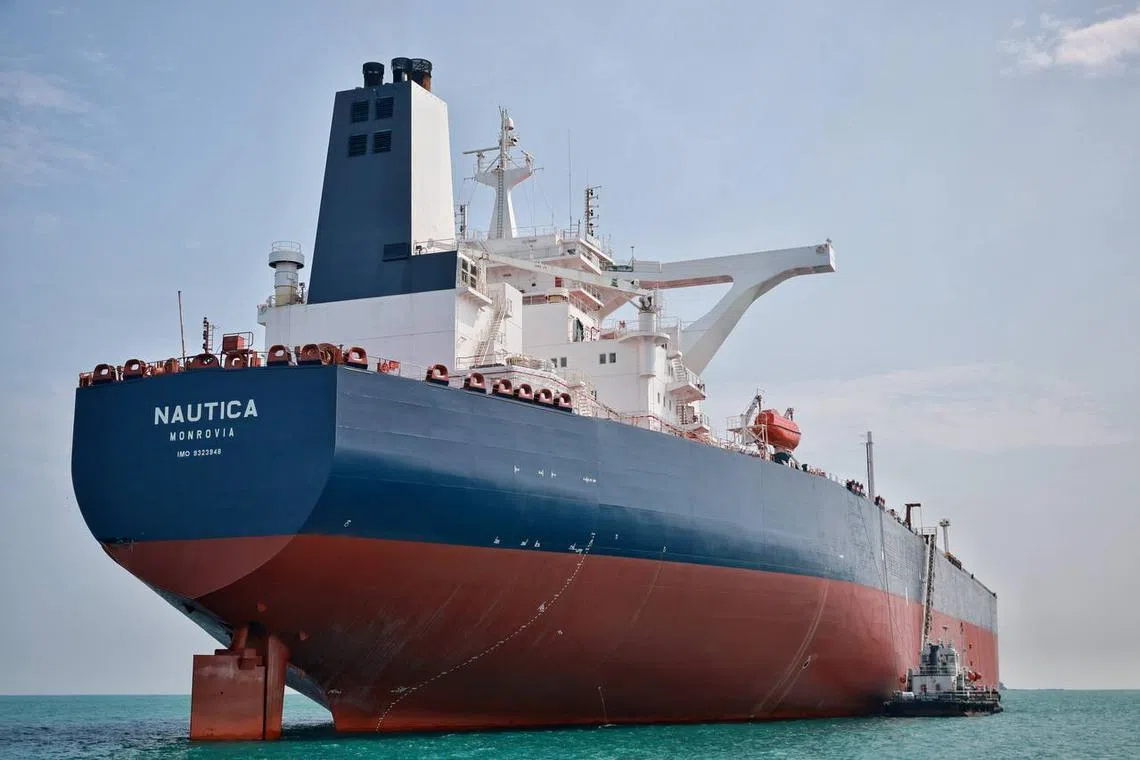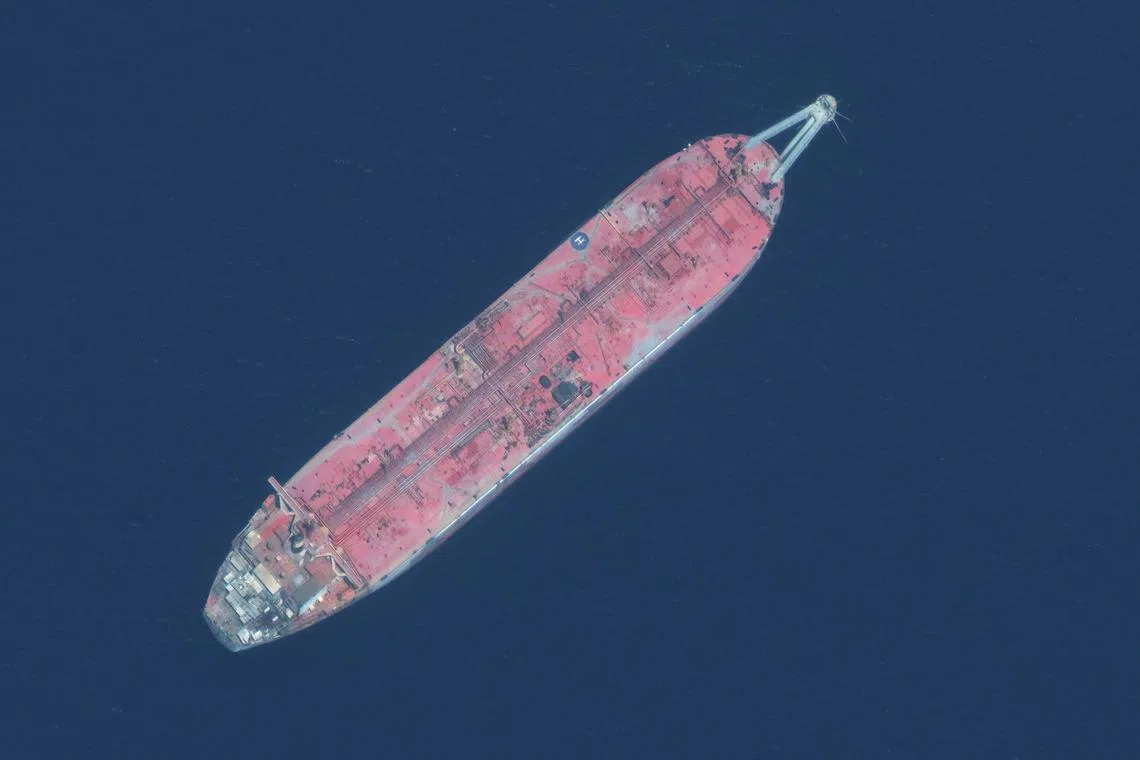UN mission to avert a $26b oil spill disaster off Yemen still short of full funding
Sign up now: Get ST's newsletters delivered to your inbox

The Nautica, currently in Singapore to refuel, is anchored near the south of Pulau Semakau. It continues its journey to the Red Sea on Tuesday.
ST PHOTO: JASON QUAH
WASHINGTON - Singaporeans, used to big ships, may not particularly notice supertanker Nautica as she stops over this weekend to refuel.
But hers is a voyage like no other. She is on a mission to avert a devastating oil spill which would threaten lives and livelihoods, and cost US$20 billion (S$26.6 billion) to clean up.
The Nautica, which left dry dock in Zhoushan, China, on April 6, is bound for Yemen, marking a significant step forward in a complex, multinational operation coordinated by the United Nations Development Programme (UNDP) to drain 1.1 million barrels of oil from a floating storage and offloading vessel, the Safer, moored roughly 9km off Yemen’s west coast.
With Yemen engulfed in civil war, the Safer (pronounced to rhyme with “sapper”) has been moored at the same spot for over 30 years without any dry-docking or shipyard repairs since 2015, decaying to the point where there is an imminent risk it could break apart, spilling its contents into the sea, or even explode.
Experts have long warned that a major spill would devastate fishing communities on Yemen’s Red Sea coast, likely wiping out 200,000 livelihoods and exposing whole communities to life-threatening toxins in the air and water alike.
The disaster could close ports essential to bringing food, fuel and life-saving supplies into Yemen, where 17 million people need food assistance. Oil from the Safer could affect any country on the Red Sea. Closure of desalination plants would cut off water sources for millions, and the impact on coral reefs, mangroves and other marine life would be severe; fish stocks would take 25 years to recover.
The UNDP has contracted marine salvage company SMIT to remove the oil and prepare the Safer for towing to a green salvage yard. Yemen will get the fully functional Nautica as a replacement.
While it is a major achievement that the mission is now under way, it still needs to be fully funded to succeed. The effort is estimated to cost US$129 million.
“We are still talking about US$29 million that have not yet been secured,” Mr Achim Steiner, administrator of the UNDP, told The Sunday Times on Friday.
“And this is obviously, for us, an extremely challenging situation, because an organisation like UNDP can only implement an activity if it has the firm commitments of funding,” he said.
“We are at the moment working on some emergency bridging financing solutions in order not to jeopardise the timeline, or the operation as a whole.”
There are “indications… from many quarters, that they are considering further financing”, Mr Steiner said. All eyes are now on a donor pledging meeting on May 4, convened by the Netherlands and the United Kingdom.
“We also look, to be very frank, to leaders in the corporate world”, he said, adding: “I’m still sometimes a little bit perplexed at the oil and gas sector in terms of individual companies as not being more forthcoming.”
“We’ve had a couple of corporations step forward, and we’ve had the oil and gas producers’ umbrella organisation step forward... This is a collective undertaking and my hope remains that we are able to get firm commitments for these 29 million in the next three weeks.”
Meanwhile, the UN has resorted to crowdfunding.
Environmental organisations have lambasted big oil companies for not coming forward with full funding.
In a separate interview, Mr Paul Horsman, leader of a response team on the Safer crisis at the environmental organisation Greenpeace, told The Sunday Times: “The fact that the UN has to crowdfund is ridiculous.”
“They have got kids doing bake sales and jumble sales to raise funds”, while “oil companies have just this year again announced record profits in billions of dollars”, he said.
“It exposes the oil industry as totally irresponsible… taking into account the fact that they are responsible for that oil being there in the first place,” Mr Horsman said.
“They have the wherewithal both financially and technically. And yet they’ve been found wanting when it comes to trying to prevent what could be a major environmental disaster,” he added.
Mr Steiner said: “Very often the UN is the institution of last resort in a situation where crisis and conflict coincide, and where essentially normal ways of solving problems simply do not work.
“This was the case here in Yemen, where a tanker, fully loaded with over a million barrels of oil, had reached a point of essentially being at risk of falling apart, or even of explosions happening. Some smaller leaks having already occurred.
“And because of it being in a conflict zone, and therefore not being able to deal with this problem in a normal salvage operation, the UN became the platform on which an agreement was negotiated over a number of years.”

The Safer, moored at the same spot 9km off Yemen for over 30 years, is at risk of breaking apart or even exploding.
PHOTO: AFP
An in-principle agreement reached last year created the conditions for the UN operation. But it still took months to be able to pull all the parts together, including buying the Nautica.
“It had to be financed,” Mr Steiner said. “And because of the war in Ukraine and the enormous impact that has had on crude carriers… initial budgetary parameters simply no longer worked, because the price for these large vessels literally exploded on the global marketplace.”
“We have taken it in three different steps,” he said. “One, was to secure that tanker, because we needed an alternative vessel. Second, to negotiate the operational protocols with all the parties in the country (Yemen). And third, to contract an international leading expert in ship-to-ship transfers… with whom we are finalising the actual operational plan as we speak.”
On the bright side, “we have had tremendous support from governments who have stepped forward”, said Mr Steiner.
“We have had, through crowdfunding, support even from school classes, from individuals, and it makes a difference. And in a sense, this is truly a UN-sponsored operation because we have benefited from many, many different forms of support, including technical advice on contingency planning, and also the insurance world with whom we have been working over the past four months to put in place the kind of insurance packages that are needed for such an operation to happen in a conflict zone. “I think that is actually a good illustration of how you provide a platform where many can bring the best that they have to offer in such a situation,” he said.
The Nautica is currently south of Semakau, according to live marine traffic maps. The supertanker will leave Singapore on Tuesday, and is scheduled to arrive in the Red Sea by the end of the month.



